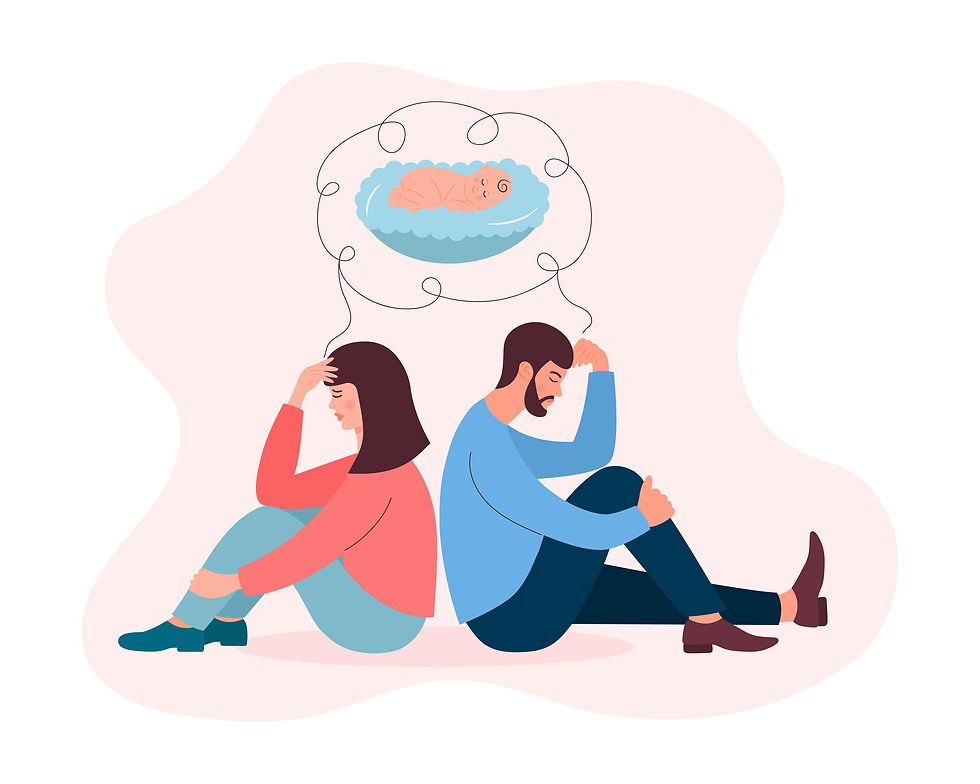Navigating the Journey of Trying to Conceive: What to Expect and How to Cope if takes longer than you expected or you experience fertility challenges
- Brenley Wiley
- Dec 10, 2024
- 4 min read
The journey to starting a family can be both deeply rewarding and emotionally challenging, with the stigma of infertility and pressure from friends and family adding to the stress. The stress of not conceiving right away can also take an additional emotional toll.

Let's address some common myths and explore the impact of not getting pregnant immediately:
Myths:
You should get pregnant immediately after stopping birth control: each individual's body is different and it can take time for your body to adjust after being on a hormonal contraceptive. Depending on the type of birth control used, it may take a few months for your menstrual cycle to regulate. There’s no need to panic if conception doesn’t happen immediately. Listen to your body and give it time.
Stress is the main reason people don't get pregnant: a lot of women are told that if they are not stressed, they will conceive. While stress can affect your overall health, it doesn’t automatically prevent pregnancy. It's important to focus on ways to help you cope with your stress to help improve your overall wellbeing.
Sharing your fertility journey with others is awkward or may place too much pressure on them: vulnerably sharing with loved ones can foster understanding and support. Many times, loved ones will be appreciative of the opportunity you gave them to offer you empathy and love.
You won’t feel disappointment if you don’t get pregnant each month: it's completely understandable to feel disappointment each month, especially when it's been multiple months of trying to conceive. It's okay to acknowledge these feelings that are coming up for you.
If you're doing everything correctly, pregnancy will happen: fertility is complex, and even if you're following all the right steps, conception doesn't always happen as expected. Many factors are at play, and sometimes it takes longer than anticipated, even for perfectly healthy couples.
Trying to conceive can be an emotional rollercoaster. While it’s often filled with hope, excitement, and anticipation, it can also bring moments of anxiety, frustration, and disappointment. As a therapist, my goal is to help you navigate these ups and downs, offering strategies to support your mental health and emotional well-being throughout the process.

Understanding Your Emotions
It's normal to feel a wide array of emotions when trying to conceive. A lot of times individuals are experiencing heightened emotions, stress in relationship dynamics, possibly one partner feeling more pressure or responsibility, and uncertainty of how to share with others. There is oftentimes a mix of grief and joy as individuals are grateful for the life they have while also holding space for the sadness and grief of infertility or loss.
Key Emotions You Might Experience
Hopefulness: Imagining a future with a child can bring immense joy.
Frustration: Each month that doesn’t lead to conception can feel disheartening.
Isolation: You may feel that others don't understand what you're going through.
Jealousy: Seeing others conceive can trigger feelings of envy, even if you’re happy for them.
Finding Support
You don’t have to go through this journey alone. Connecting with others who are also trying to conceive can provide comfort and understanding. Here are a few ways to find support:
Join Support Groups: Look for local or online groups where you can share your experiences and feelings.
Talk to Friends and Family: Don’t hesitate to share your journey with those you trust. Their support can be invaluable.
Seek Professional Help: A therapist who specializes in fertility issues can provide a safe space to explore your emotions and develop coping strategies.
Coping Strategies
Here are some strategies to help you manage the emotional ups and downs of trying to conceive:
Mindfulness and Relaxation Techniques: Practices such as meditation, yoga, or deep-breathing exercises can help reduce anxiety and improve your emotional well-being.
Keep a Journal: Writing about your feelings can be a powerful way to process your emotions. Consider documenting your thoughts, fears, and hopes throughout your journey.
Establish a Routine: Maintaining a healthy lifestyle with regular exercise, balanced nutrition, and sufficient sleep can help you feel more in control.
Limit Social Media Exposure: While it can be helpful to connect with others online, sometimes scrolling through social media can amplify feelings of inadequacy or jealousy. Consider taking breaks when needed.
Focus on What You Can Control: There are many aspects of the trying to conceive process that are out of your hands. Redirect your focus towards areas you can influence, such as self-care and your relationship with your partner.
Embracing Uncertainty
The path to parenthood can be unpredictable. It’s essential to cultivate patience and resilience. Try to embrace the uncertainty, knowing that many couples experience challenges before achieving their dreams of parenthood.
Conclusion
Remember, it’s okay to feel overwhelmed, anxious, or even sad during this time. Acknowledging your emotions and seeking support can make a significant difference in your mental well-being. While the journey to conception can be challenging, know that you’re not alone, and there are resources and strategies available to help you along the way.
If you find yourself struggling with the emotional aspects of trying to conceive, consider reaching out to a mental health professional. Together, you can explore your feelings and develop coping mechanisms tailored to your unique situation. You are deserving of support and understanding on this journey.
Beginning in January, Steady Hope will be launching a new support group for women experiencing infertility.
Email brenley@steadyhope.com for more information or to reserve your spot, fill out this form here: https://www.steadyhope.com/event-details-registration/hope-healing-a-support-group-for-women-expereincing-fertility-challenges-1

We look forward to meeting you and creating space for you as you connect with other women in our community.


